The Electronic Intifada 14 October 2025
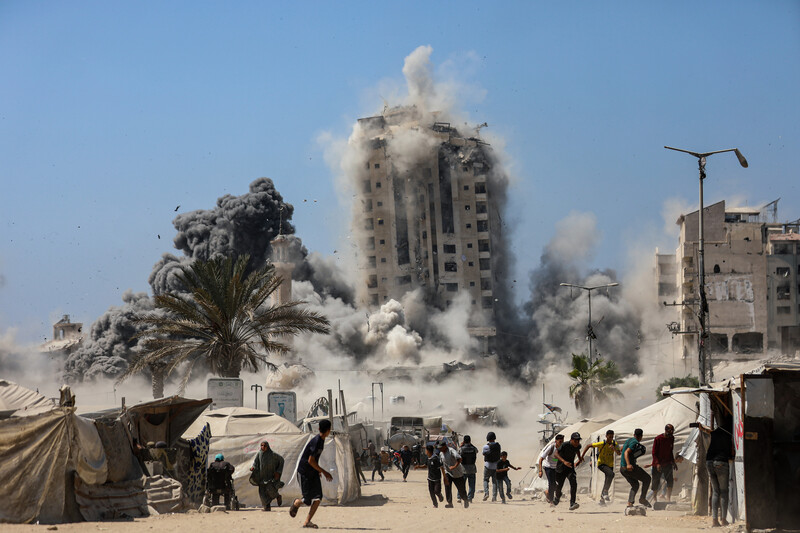
Smoke billows during Israeli strikes on a Gaza City tower on 5 September.
APA imagesThe Israeli military killed nearly 2,300 Palestinians in the occupied Gaza Strip between 27 August and 1 October and injured nearly 9,800 people, according to health ministry data.
As of 1 October, the health ministry had reported 66,148 fatalities and 168,716 injuries in Gaza since 7 October 2023. The total number of fatalities includes 300 people who were retroactively added in late September after their identification details were approved.
According to the health ministry, 2,580 people have been killed and more than 18,900 injured while trying to access aid since 27 May this year, when the Gaza Humanitarian Foundation, a US and Israeli militarized aid scheme, began operations.
More than 450 malnutrition-related deaths, including 151 children, were recorded by the ministry between October 2023 and 1 October this year.
Several Israeli soldiers were killed in Gaza during September. Among them were four soldiers killed by an explosive device in Rafah, southern Gaza on 18 September and four killed by an explosive device that was thrown into a tank hatch in Jabaliya, northern Gaza, on 8 September.
After the 18 September incident, an Israeli military officer told the Tel Aviv newspaper Haaretz that “the army has simply collapsed and there’s no one to turn to.”
According to the Israeli military, 466 soldiers have been killed and more than 2,900 injured during ground operations in Gaza.
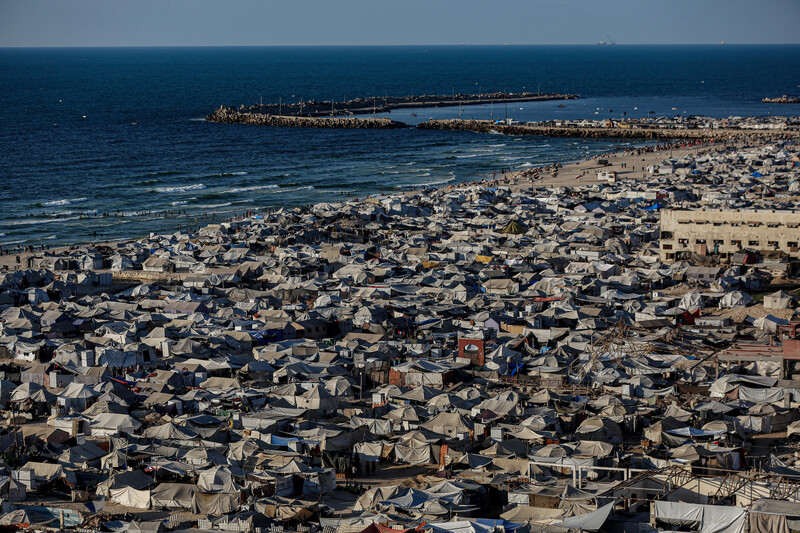
Makeshift tent camps in Gaza City, 1 September.
APA imagesIn the occupied West Bank, 13 Palestinians, including two children, were killed by Israeli forces and one Palestinian was killed by a settler during September. More than 200 Palestinians were injured by soldiers and settlers during the month.
Six Israelis were killed and 21 people were injured in the West Bank after two Palestinians opened fire at a bus station in Ramot settlement in East Jerusalem on 8 September. The two assailants were shot and killed at the scene.
The armed wing of Hamas claimed responsibility for the attack the following day.
Two Israelis were killed by a Jordanian national at Allenby crossing on the boundary between Jordan and the West Bank on 18 September.
The UN Office for the Coordination of Humanitarian Affairs stated on 24 September that nearly 1,000 Palestinians have been killed in the West Bank, including East Jerusalem, since 7 October 2023. That figure includes two people who died of wounds sustained prior to that date.
“Of the total, 965 Palestinians were killed by Israeli forces, 19 by Israeli settlers, and 10 where it remains unknown whether the perpetrators were Israeli forces or settlers,” according to OCHA.
“More than half of the 965 Palestinians fatalities by Israeli forces (643) were in the northern West Bank,” OCHA added.
Palestinians killed 41 Israelis, including 22 soldiers, in the West Bank during the same period.
“In Israel, attacks by Palestinians from the West Bank resulted in the killing of 17 Israelis and nine Palestinian perpetrators, in addition to a Palestinian killed in an attack by Israelis in West Jerusalem,” according to OCHA.
The UN office said that between 7 October 2023 and 29 September this year, it had documented the withholding of the bodies of 199 Palestinians from the West Bank by Israeli forces, of whom seven were subsequently handed over and 192 remain withheld.”

Israeli settlers, backed by Israeli colonial forces, seize a 400-square-meter Palestinian home in the Old City of Hebron in the West Bank, 2 September. The UN said that Palestinians in the area fear that their movement could be restricted even further.
ActiveStillsThe Palestinian fatalities in the West Bank during the month include a 25-year-old man who was shot in the chest by an Israeli sniper during a raid in Balata refugee camp in Nablus on 3 September.
Two days later, Israeli forces shot and killed a 58-year-old Palestinian man at a checkpoint near Nablus, reportedly after a verbal altercation.
Israeli forces shot and killed two Palestinian boys, Islam Majarmah and Muhammad Masqala, both 14 years old, near the entrance to Jenin refugee camp in the northern West Bank on 8 September.
Jenin refugee camp has been under siege by the Israeli military since late January this year and all residents have been forcibly displaced.
Islam Majarmah and his family were returning from checking on their home in Jenin camp when they were approached by an Israeli military vehicle driving at high speed. Soldiers exited the vehicle and fired toward the family, hitting Islam in the back, according to Defense for Children International-Palestine.
Muhammad Masqala was shot twice by Israeli forces concealed behind an earthen barrier while standing near the main entrance to Jenin camp.
“Israeli forces have killed 40 Palestinian children in the occupied West Bank in 2025, including 14 children from Jenin,” according to Defense for Children International-Palestine. The group added that 214 Palestinian children have been killed by Israeli forces and settlers in the West Bank since 7 October 2023.
On 13 September, a Palestinian man succumbed to wounds sustained the previous day when Israeli forces and settlers shot toward Palestinians at Deir Jarir village near Ramallah in the central West Bank.
Israeli forces shot and killed a man from a village near Jenin as he attempted to cross the Israeli wall in the Jerusalem area on 15 September. According to the UN Office for the Coordination of Humanitarian Affairs, at least 13 Palestinians have been killed while trying to cross the barrier since October 2023 after Israel suspended or revoked most permits for Palestinians to access East Jerusalem and Israel for work.
On 16 September, two men were shot and arrested by undercover forces who raided the city of Qalqiliya and surrounded their homes. “Later that day, Israeli forces informed the Palestinian District Coordination Office of the death of the two men, whose bodies they withheld,” according to OCHA.
On 23 September, Israeli settlers shot and killed a Palestinian man in al-Mughayyir town near Ramallah.
Israeli forces shot and killed an 18-year-old Palestinian during a raid in Anza village near Jenin on 24 September. The following day, undercover Israeli forces shot and killed two Palestinian men during an exchange of fire in Tammun, a town near Tubas, according to OCHA.
A Palestinian man and an Israeli soldier were killed in an alleged vehicle ramming attack on soldiers near Qalqiliya on 28 September.
“The body of the Palestinian man has been withheld by Israeli forces,” according to OCHA. “Circumstances around the incident remain unclear.”

Tightly packed tents after the displacement of Palestinians from Gaza City to al-Mawasi, an area west of Khan Younis in the southern Gaza Strip, 2 September.
DPA via ZUMA PressTwo million people in Gaza were at risk of deadly epidemics and infectious diseases, the Palestinian human rights group Al Mezan warned on 1 September.
Thousands of cases of people presenting symptoms of a new contagious disease with symptoms similar to the flu and COVID-19 were being received at Gaza’s hospitals, according to the health ministry in the territory.
The ministry was unable to identify the virus “due to the absence of essential diagnostic equipment such as PCR and rapid tests,” Al Mezan said.
Bed occupancy at Gaza hospitals has surged by 300 percent compared to normal capacity, the rights group added. This has forced “patients onto floors and into hallways, making it nearly impossible to administer proper medical care under circumstances where medical supplies are already severely depleted,” Al Mezan said.
There is an urgent need for the “unhindered entry of humanitarian aid and medical supplies through all crossings,” Al Mezan added, as well as for the evacuation of sick and wounded people for treatment abroad.
“Materials needed for the rehabilitation of hospitals and essential services, such as water, sanitation, electricity and waste management, are equally necessary,” according to the group.
The Gaza City Municipality warned on 2 September that intensified Israeli military operations were preventing crews from maintaining critical infrastructure, potentially leading to sewage overflow and flooding.
Even limited waterfall could cause an overflow of Gaza City’s largest rainwater collecting site which was contaminated with untreated sewage, which would heighten the risk of disease outbreaks and groundwater contamination.

Israeli soldiers stand guard as settlers tour the Palestinian side of the Old City and market of Hebron in the occupied West Bank, 6 September.
APA imagesAlso on 1 September, Al Mezan published a comprehensive report on Israel’s violations against Palestinian journalists and media workers in Gaza.
“These violations have taken multiple forms, including targeted killings, physical and mental harm, arbitrary detention and torture, incitement to violence, collective punishment and the wanton destruction of media offices and equipment,” Al Mezan said.
Between 7 October 2023 and the end of June this year, “Israeli forces killed 273 Palestinian journalists and media workers in Gaza – 240 men and 33 women,” according to Al Mezan.
Al Mezan’s field data shows that around 100 photojournalists, 80 reporters, 30 editors, 20 writers, 15 news anchors, 10 program hosts and 20 technicians were killed, most of them targeted in residential areas.
The family members of journalists have also been targeted in deadly attacks.
The rights group said that based on the evidence contained in its report, it has “determined that this campaign of violence, directed by Israeli authorities at the highest political and military levels, is not incidental.”
The violations are “part of a deliberate effort to silence the documentation, reporting and public exposure of Israeli atrocities against Palestinians” – a conclusion reinforced by Israel’s ban on foreign journalists entering Gaza, Al Mezan said.
Photojournalist Rasmi Salem was killed in Gaza City, the Palestinian Journalists Syndicate announced on 2 September.
Yahya Barzaq, also a photojournalist, was killed in an Israeli airstrike in Deir al-Balah, central Gaza, on 30 September after being displaced from northern Gaza four days earlier.
More than 250 Palestinian journalists have been killed since October 2023, including one in the West Bank, the Palestinian Journalists Syndicate said on 26 September, the annual International Day of Solidarity with Palestinian Journalists.
The syndicate added that dozens more are injured, missing or in Israeli detention or have been forcibly displaced from their homes, of which more than 670 have been destroyed.

Taha Abu Labda, 18, lost his eyesight after being shot directly in the eyes by an Israeli sniper while trying to rescue a wounded man lying on the ground. Photographed on 6 September, the teen was rushed to Nasser Medical Complex in Khan Younis, southern Gaza, but doctors were unable to save his vision. Taha later died from his injuries.
ActiveStillsOn 4 September, the UN children’s fund UNICEF said that “the unthinkable in Gaza City has already begun.”
Tess Ingram, a communications officer with UNICEF, said during a briefing that over nine days in Gaza City, she had met families who had recently fled from their homes “with nothing but the clothes on their backs.”
“I met children who were separated from their parents in that chaos,” Ingram added. “Mothers whose children have died of starvation. Mothers who fear their children will be next.”
Ingram said that she met a mother whose daughter Jana was treated for and recovered from malnutrition in 2024 but whose health deteriorated after Israel imposed a blockade on aid in March this year. The girl is “barely hanging on” and her 2-year-old sister Jouri died from malnutrition, Ingram said.
Meanwhile, “hospitals in Gaza City are on their knees,” Ingram added, with only 40 incubators between them running at up to 200 percent capacity, “meaning as many as 80 babies are fighting for life in overcrowded machines” dependent on generators that may run out of fuel.
On 5 September, independent UN human rights urged the General Assembly “to take decisive leadership and act to prevent further catastrophe” following the formal confirmation of famine in Gaza in August.
More than 360 people in Gaza had “died due to malnutrition, including 130 children,” the experts said. “Thirteen of them, including 3 children, have died in the past 24 hours.”
On 11 September, UNICEF said that around a dozen nutrition centers were forced to close amid Israel’s military escalation in Gaza City, “leaving children even more vulnerable,” according to Catherine Russell, the head of the agency.
Some 12,800 children were identified as acutely malnourished in Gaza during August, but fewer children were screened overall due to the closure of treatment centers in Gaza City and the North Gaza governorate.
“The escalating military offensive in Gaza City is having devastating consequences for over 450,000 children, already traumatized and exhausted by nearly two years of unrelenting war,” Edouard Beigbeder, a senior UNICEF official, said on 12 September.
“They are teetering on the edge of survival as both famine and deadly violence spread,” he added.
“If disconnected from their treatment, there is a high risk some of the 2,400 children currently being treated for severe acute malnutrition in [Gaza City] could starve to death,” according to Beigbeder.

Smoke and flames rise while a residential building collapses after an Israeli airstrike in Gaza City, 7 September.
APA imagesChildren began the new school year in the West Bank during September.
For the first time since the founding of UNRWA, the UN agency for Palestine refugees, it was unable to reopen schools in East Jerusalem after Israel forced their closure in May last year. Those closures affected nearly 800 students, only some of whom have been able to enroll in other schools, according to UNRWA.
Ten UNRWA schools in the Jenin, Tulkarm and Nur Shams refugee camps in the northern West Bank have been forced to close due to Israel’s ongoing military siege that began in January.
As a result, according to UNRWA, more than 4,000 children are “participating in adapted education programs including remote learning, self-learning materials and temporary learning spaces” rather than being educated in their classrooms.
Children in Gaza, where educational infrastructure has been destroyed, were denied access to education for a third consecutive academic year.
More than 700,000 students should have started the school year in September, including some 56,000 children entering school for the first time.
More than 658,000 students in Gaza have lost two consecutive years of schooling, according to OCHA. Around 71,000 students in Gaza have not yet sat for their final exams, known as tawjihi, preventing them from transitioning to higher education.
The UN human rights office, citing the Palestinian education ministry, said that more than 17,230 students were killed along with nearly 1,000 educational staff since 7 October 2023.
“Repeated attacks on schools and the killing of students and teachers are serious violations of international humanitarian law and may amount to war crimes,” the UN office stated.

Newborn Hamza al-Rubai receives medical care at Al-Helou Hospital in Gaza City on 7 September after being delivered via surgery from his mother who lost her life in an Israeli airstrike that targeted their tent near Al-Shifa Hospital. The baby is the sole survivor of his family after his parents and three siblings were killed.
APA imagesOn 5 September, Volker Türk, the UN human rights chief, called on the US to lift sanctions imposed on three prominent Palestinian human rights groups the previous day.
Marco Rubio, the US secretary of state, said that the sanctions were imposed due to the human rights groups’ engagement with the International Criminal Court’s efforts to “investigate, arrest, detain or prosecute Israeli nationals, without Israel’s consent.”
Türk said that the measures would have a chilling effect on civil society not only in the occupied Palestinian territories and Israel “but potentially globally.”
The human rights chief also called on the US to withdraw sanctions imposed on Francesca Albanese, the UN special rapporteur on the West Bank and Gaza Strip, and on several ICC judges and prosecutors.
On 9 September, independent UN human rights experts urged the US “to grant Palestinian leaders visas ahead of the UN General Assembly … and lift the discriminatory suspension of processing visitor visas for all Palestinian nationals.”
Rubio announced in late August that the US would deny and revoke visas for Palestinian officials ahead of the UN General Assembly meeting, during which several of Washington’s allies were expected to recognize a Palestinian state.
The US insists on bilateral negotiations between Israel and the Palestinians, rather than a rights-based approach.
“There is no legal obligation under international law to negotiate independence where self-determination has been forcibly denied by an occupying power for almost 60 years,” the UN experts said.
“Diplomacy offers the hope of peacefully settling even the most difficult disputes,” they added.

A view of the produce market after it was razed by Israeli bulldozers in Beita village, near the northern West Bank city of Nablus, 8 September.
APA imagesOn 8 September, Medical Aid for Palestinians said that the Israeli military attacked two of its partner organizations in Gaza City.
In a 7 September attack, an employee of the Association for Women and Child Protection and a pregnant woman seeking support from the group, were killed, as well as a child. The previous day, a medical point run by Ard El Insan was forced to stop providing services “after being damaged by an attack on a nearby school,” according to MAP.
The Tamer Institute for Communication reported that one of its staff members, Muhammad Hassouna, was killed on 14 September.
Action Against Hunger, a charity based in Canada, said that Mustafa al-Ejla, who worked at one of its warehouses in Gaza City until it was rendered inaccessible due to displacement orders, was killed in an airstrike near his family’s home on 16 September.
Al-Ejla, 29, was the third member of Action Against Hunger’s Gaza team to be killed since June this year, the charity added.
On 17 September, Doctors Without Borders said that Hussein Alnajjar, a nurse, died the previous day from injuries caused by an Israeli airstrike days earlier that also injured his sister-in-law and nephew.
Alnajjar, the 13th worker with the French charity to be killed in Gaza since October 2023, was a “dedicated nurse, husband and father” who was looking forward to seeing his brother graduate from medical school in Egypt, Doctors Without Borders added.
Also on 17 September, the Maan Development Center announced that one of its workers, Amjad Abu Sultan, was killed in Gaza City while preparing to evacuate to the south.
The global confederation CARE International said that Tasneem Shublaq, a pregnant aid worker, and her two young children were killed in an Israeli strike on her apartment building on 20 September.
Shublaq was a psychologist with Juzoor for Health and Social Development and worked at a school sheltering displaced people in the al-Daraj neighborhood of Gaza City.
“Her husband was critically injured and is currently in intensive care,” CARE said. “Having already endured the killing of his other 3-year-old son last year, if he recovers, he will now have to face a life without his family.”
The UK charity Oxfam said on 27 September that Shublaq’s husband succumbed to his injuries. The charity noted that another of the couple’s children was killed in the strike.
According to UN data, at least 565 aid workers were killed between 7 October 2023 and 7 October 2025, including 376 UN staff, 54 Palestine Red Crescent Society staff and volunteers, and four International Committee of the Red Cross staff.
Around 1,700 health workers were killed during the same period (some of them also counting toward the number of killed aid workers) and 140 civil defense workers were killed while on duty.

Smoke and flames rise as a residential building collapses after an Israeli air strike in Gaza City, 8 September.
APA imagesOn 9 September, Israel attacked a residential neighborhood in Doha in a failed attempt to kill Hamas’ lead negotiators.
The son of Khalil al-Hayya, Hamas’ lead negotiator, was killed along with a Qatari security guard.
Qatar, along with Egypt, has mediated indirect ceasefire negotiations between Hamas and Israel. The gulf monarchy called the attack “cowardly and treacherous.”
“We have put terrorists on notice, wherever they may be …. we’re going to pursue them, and we’re going to destroy those who will destroy us,” Yechiel Leiter, Israel’s ambassador to the US, stated at the Capitol the following day.
Donald Trump, the US president, said he was “not thrilled” about the Israeli attack. “We want the hostages back, but we’re not thrilled about the way it went down today,” the US president added.
The UN Security Council condemned the attack in a statement that omitted mention of Israel and which was agreed to by all 15 members, including the veto-holding US.
“Attacking our territories while we were busy with negotiations has uncovered the intention of Israel,” Sheikh Mohammed bin Abdulrahman al-Thani, the prime minister of Qatar, told the Security Council.
Volker Türk, the UN human rights chief, said during a debate at the Human Rights Council in Geneva that “Israel’s strike on negotiators in Doha … was a shocking breach of international law, an assault on regional peace and stability, and a blow against the integrity of mediation and negotiating processes around the world.”
Qatar told the Human Rights Council that the attack amounted to “state terrorism.”
Later in the month, Israel’s Benjamin Netanyahu apologized to the prime minister of Qatar in an apparent concession to Trump.
President Trump signed an executive order stating that any attack on Qatar – a close ally of Washington that hosts the largest US military base in the region – would be considered “a threat to the peace and security of the United States.” The executive order, dated 29 September, was signed during Netanyahu’s visit to Washington.
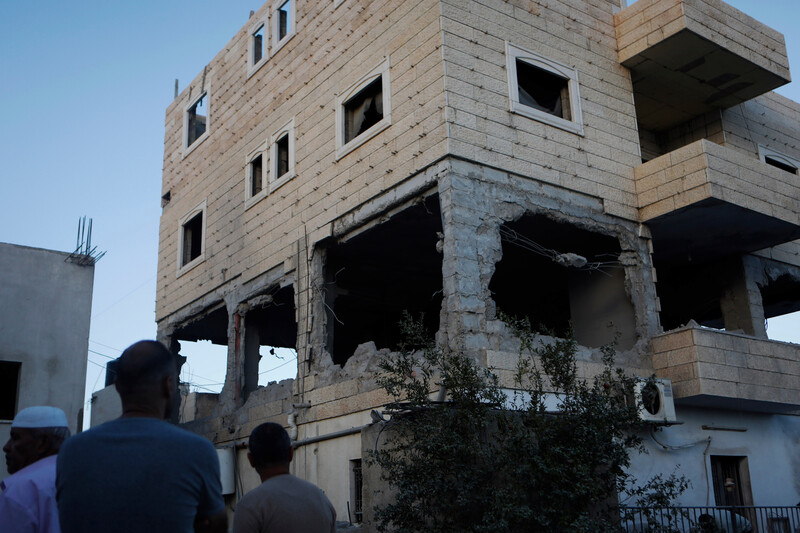
People observe the destruction after Israeli forces blew up the house of prisoner Thabet Masalmeh in the town of Beit Awa, west of Hebron in the occupied West Bank, on 9 September.
APA imagesOn 9 September, independent UN human rights experts called on Israel to “cease all threats of harm against the Global Sumud Flotilla and ensure it proceeds unhindered in its mission to deliver humanitarian aid to the civilian population in Gaza.”
The Global Sumud Flotilla, comprising more than 50 ships carrying activists from around 40 countries, set sail from Barcelona on 31 August with a second wave of ships scheduled to depart later from Tunisia, Italy, Greece and other Mediterranean countries.
The experts said that the flotilla was necessitated by the failure of the UN General Assembly and Security Council to take “decisive action to ensure safe and unimpeded delivery of humanitarian aid into Gaza.”
Israel attacked another solidarity ship in June this year and killed 10 people in an attack on the Mavi Marmara in international waters in May 2010.
Itamar Ben-Gvir, Israel’s far-right national security minister, presented Israel’s cabinet with a plan to detain flotilla participants “under harsh conditions usually reserved for ‘security prisoners,’ with basic needs and communications denied,” the UN experts noted.
“Such measures would be unlawful and would amount to collective punishment, intimidation and reprisals against human rights defenders,” the experts added.
On 24 September, the UN human rights office said that attacks and threats against those seeking to deliver aid to Gaza “defy belief” and called for independent, impartial and thorough investigation into attacks and harassment against the Global Sumud Flotilla.
Italy and Spain deployed naval ships to protect the flotilla in late September while Italy proposed what it called a compromise that would see aid supplies dropped off in Cyprus. From there, the Latin Patriarchate of Jerusalem would ensure their delivery to Gaza.
The Italian flotilla delegation rejected the proposal, saying that “our mission stays true to its original goal of breaking [Israel’s] illegal siege and delivering humanitarian aid to the besieged population of Gaza.”
According to Reuters, the Israeli military intercepted around 40 boats in the flotilla some 70 nautical miles off of Gaza’s coast in early October and detained more than 450 participants, sparking global condemnation and protest.

Asad, 9, lost his left hand and his leg was injured in an Israeli missile strike while he was playing outside his family’s tent near a cemetery in the al-Sawarha area of central Gaza. Asad, photographed on 10 September, urgently needs proper treatment and a prosthetic hand.
ActiveStillsOn 10 September, the UN human rights office demanded that Israel “immediately halt its attack on Gaza City,” where its military ordered the displacement of all residents the previous day.
“The widespread forced displacement of Gaza City’s population risks becoming permanent by turning these areas into an uninhabitable wasteland,” the UN office said.
The UN office said that Israel’s conduct “suggests a deliberate plan to forcibly displace Palestinians by spreading terror and rendering large swathes of Gaza unlivable.”
The aim appears to be “a permanent demographic shift in Gaza that is tantamount to ethnic cleansing,” the UN office added.
Since the Israeli cabinet’s decision to seize control over Gaza City on 8 August, the military has destroyed a significant number of residential buildings and systematically demolished “entire residential neighborhoods in northern Gaza,” the UN office said.
At least 379 people were killed in 270 attacks on residential buildings in Gaza City and the North Gaza governorate since 8 August. An additional 44 strikes on tents housing displaced people in Gaza City and northern Gaza killed more than 90 people.
“The actual numbers are likely to be much higher,” the UN office said. “Most attacks occurred with no prior warnings reported.”
The UN office added that “states are under an urgent obligation to exert maximum pressure on Israel to immediately halt this offensive.”
“Continuing to provide aid or assistance to Israel – such as through the provision of weapons or parts of weapons, intelligence, or logistical, diplomatic or financial support – could make states complicit in atrocity crimes.”

People inspect the damage at Ibn Taymiyyah mosque, destroyed in an Israeli airstrike on Deir al-Balah in central Gaza, 10 September.
APA imagesOn 15 September, UN human rights experts warned of the severe harm resulting from Israel’s attacks on Gaza and “financial stranglehold across the occupied Palestinian territory.”
“Economic life in Gaza has been decimated,” the experts said, with unemployment having surged to over 80 percent.
Israel is blocking the inflow of new currency into Gaza, where most banks and ATMs have been destroyed, giving way to a “liquidity crisis,” the experts added. Those who are receiving wages are losing nearly 40 percent of their salaries to access cash.
Thousands of jobs are at risk with new Israeli laws restricting UNRWA and the suspension of US funding to the UN agency for Palestine refugees.
In the West Bank, meanwhile, Israel has “arbitrarily diverted and withheld tax revenues owed to the Palestinian Authority, preventing salary payments and undermining liquidity,” the experts said.
Israel has threatened to not renew a waiver that allows Israeli banks to process transactions with their counterparts later the year. If it follows through on the threat, “this would cut Palestinians off from the global financial system,” the experts added.
Meanwhile, Israel has suspended work permits for around 100,000 Palestinians in the West Bank, “slashing cash inflows that previously represented a quarter of all gross national income.”
“The international community must act urgently to compel Israel to stop violating fundamental rules of international law, respect the economic rights of the Palestinian people, alleviate the humanitarian crisis and prevent financial collapse,” the experts added.
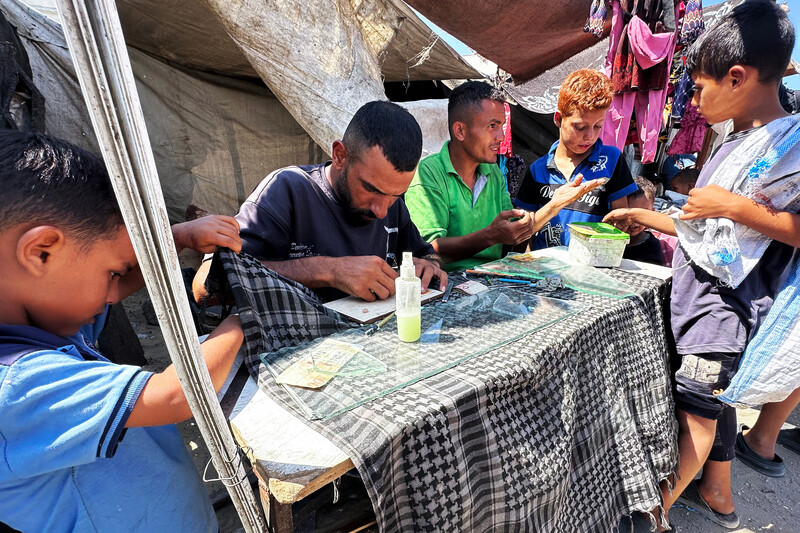
Palestinians repair old and worn-out banknotes in Gaza City as the enclave runs out of hard currency, 11 September. Gaza faces a severe liquidity crisis after the destruction of numerous banks and ATMs by the Israeli army while Israel continues to block financial transfers. The circulation of damaged and worn-out banknotes has created further complications, as vendors cannot deposit them in banks and often refuse to accept them in the marketplace.
APA imagesDoctors Without Borders said that Israeli forces fired on one of its clearly identified trucks while distributing water in the Sheikh Radwan neighborhood of Gaza City on 15 September.
The attack “was a deliberate attempt to sabotage water distribution to civilians who cannot leave the area, particularly the poorest, the sick, and the most vulnerable living in tents or in the rubble of what used to be their homes,” the charity said.
An emergency room supported by Doctors Without Borders ceased operating on 12 September amid the intensification of military operations in the area, leaving people in the area without access to medical services.
“Forcing people to leave by targeting remaining shelters and infrastructure, while rendering the provision of humanitarian assistance more and more difficult is not only brutal but also illegal,” the charity said.
An Israeli airstrike destroyed one of the few original clinics left in Gaza, the UK charity Christian Aid said on 22 September. The facility belonged to the Palestine Medical Relief Society and employed 45 people and treated up to 1,000 patients each day.
It also housed the largest laboratory in Gaza, according to Christian Aid, “supporting hospitals with lab tests.”
“They gave us 30 minutes to evacuate,” a medical worker quoted by Christian Aid stated. “Everyone rushed out, and about half an hour later they hit the building.”
Three other clinics run by the Palestine Medical Relief Society were targeted in the few weeks prior.
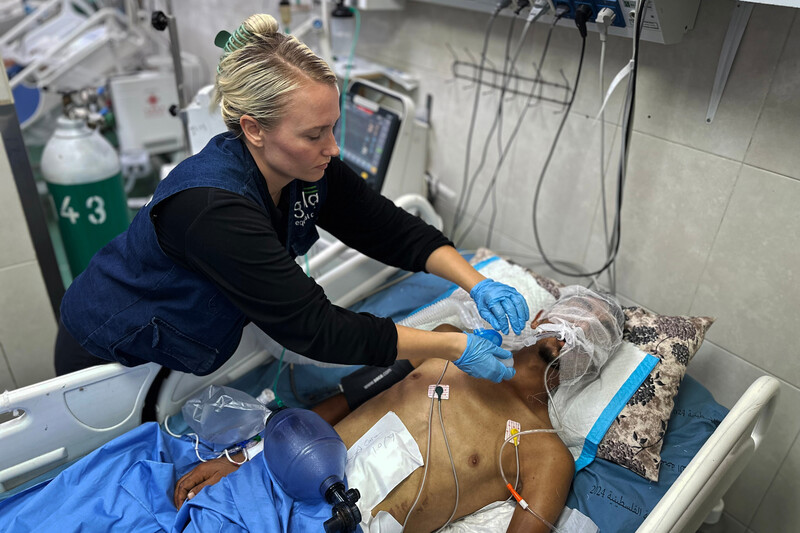
An American nurse treats an intensive care patient at Nasser Medical Complex in Khan Younis, southern Gaza, amid a severe shortage of medicines and supplies, 11 September.
APA images“Israel has committed genocide against Palestinians in the Gaza Strip,” an independent UN commission of inquiry said in a landmark report issued on 16 September.
The commission concluded that “Israeli authorities and Israeli security forces committed four of the five genocidal acts” defined by the 1948 Genocide Convention.
Those four acts include “killing, causing serious bodily or mental harm, deliberately inflicting conditions of life calculated to bring about the destruction of the Palestinians in whole or in part, and imposing measures intended to prevent births.”
The commission pointed to explicit statements by Israeli authorities – including President Isaac Herzog, Prime Minister Benjamin Netanyahu and former Minister of Defense Yoav Gallant – and a pattern of conduct of the military as direct evidence of “an intent to destroy” Palestinians in Gaza.
Israel has disregarded orders of the International Court of Justice in the genocide complaint initiated by South Africa, the commission noted. The World Court issued a preliminary decision in January 2024 finding that there was a plausible risk of genocide in Gaza.
The commission, chaired by Navi Pillay, recommended that UN member states “cease the transfer of arms and other equipment that may be used for the commission of genocidal acts to Israel.”
The commission also urged states to undertake “investigations and legal proceedings against individuals or corporations that are involved in the genocide directly or indirectly.”
“When clear signs and evidence of genocide emerge, the absence of action to stop it amounts to complicity,” Pillay said.
The leaders of more than 25 major aid agencies working in Gaza called for urgent international intervention after the publication of the commission’s report.
“The UN enshrined international law as the cornerstone of global peace and security,” the aid organizations said, adding that if “states continue to treat these legal obligations as optional, they are not only complicit but are setting a dangerous precedent for the future.”
Earlier in the month, the world’s largest academic association of genocide scholars overwhelmingly passed a resolution saying that the Israel’s “policies and actions in Gaza” met the legal criteria of genocide.
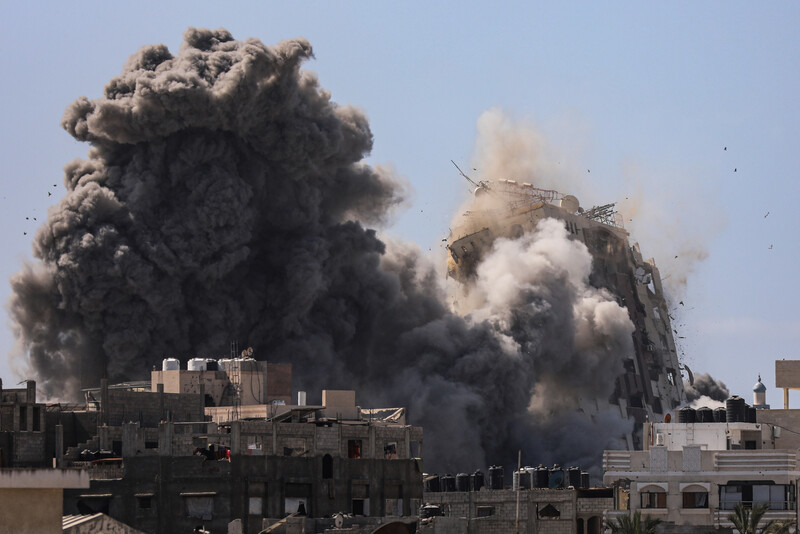
Smoke rises from al-Ghafri Tower after it was hit in an Israeli airstrike in Gaza City, 15 September.
APA imagesOn 15 September, Netanyahu acknowledged Israel’s growing economic and diplomatic isolation and said the country would need a self-reliant economy in what has become known as the Sparta Speech.
“We will need to be Athens and super Sparta,” Netanyahu said at a finance ministry conference, referencing the ancient Greek city-state associated with austerity that self-isolated to preserve its militarism.
“We have no choice. At least in the coming years, we will have to deal with these isolation attempts. What worked until now will not work from now on,” the prime minister added.
Instead of the atrocities Israel is perpetrating in full view in Gaza, Netanyahu blamed what he said was “belligerent” influence resulting from the “limitless migration” of Muslim immigrants to Europe for the country’s near-pariah status.
The prime minister also accused countries, particularly Qatar and China, of exploiting digital technology and social media platforms to promote an “anti-Israel agenda” and “besiege” the country.
He added that Israel needs to devote resources to public diplomacy, which he has been referring to as the country’s eighth battle front.
“We can break out of this isolation, but we must invest heavily in countermeasures – particularly in media and social media influence operations,” Netanyahu said, while also emphasizing reducing dependency on trade with other states.
“Not surprisingly, the vision sent shockwaves through local financial markets, leaving investors and the tech community stupefied,” an analyst for The Times of Israel wrote.
Netanyahu’s attempts to backtrack by saying that his comments were focused on the defense industry “did little to calm worries over the fate of the broader economy,” according to the analyst.
The same day as Netanyahu’s speech, according to The Guardian, “the European Commission prepared to discuss the potential suspension of part of the Israel-EU trade agreement, while the list of countries pledging to recognize Palestine continued to grow – as did the number of states threatening to boycott the Eurovision Song Contest if Israel took part.”
Earlier in the month, Spain – a NATO country that hosts two US military bases – banned ships and aircrafts carrying arms and military-grade jet fuel bound for Israel from entering its ports or airspace. Madrid also said it would bar anyone who had “participated directly in ‘genocide’ in Gaza to enter Spain,” according to Reuters.
Also in September, more than 1,800 actors, entertainers and producers – including actors Olivia Colman, Emma Stone, Mark Ruffalo and Tilda Swinton – pledged to not work with Israeli film institutions “implicated in genocide and apartheid against the Palestinian people.”
The number of signatories has increased to more than 5,000 after the release of the petition on 8 September.
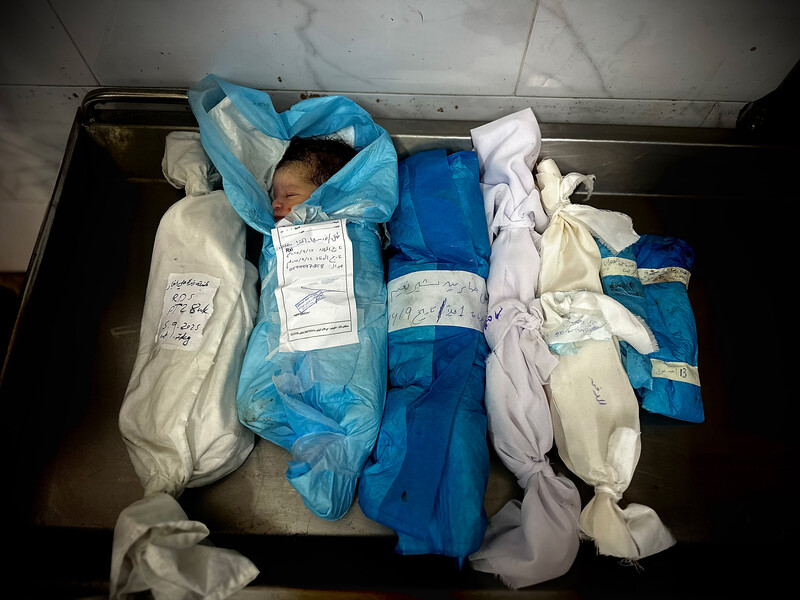
Seven babies await burial at Nasser Medical Complex in Khan Younis, southern Gaza Strip, on 15 September. They include four fetuses who died in their mothers’ wombs and three premature infants who died in their incubators. Medical sources attributed the deaths to severe maternal malnutrition, ongoing fear and psychological stress and exhaustion from displacement under the Israeli genocide on Gaza.
ActiveStillsOn 16 September, the UN human rights office in the West Bank and Gaza Strip condemned Israel’s “wanton destruction of civilian infrastructure” in Gaza City.
Israel Katz, the Israeli defense minister, boasted that “Gaza is burning” in a post on X. “The [Israeli military] strikes with an iron fist at the terrorist infrastructure and [Israeli] soldiers are fighting bravely to create the conditions for the release of the hostages and the defeat of Hamas.”
The UN office said it had recorded more than 100 attacks on or destruction of residential buildings in northern Gaza between 11 and 15 September. The office added that tents sheltering displaced people, governmental buildings and several schools and a university were also targeted.
Seventeen people, including 10 children, were killed in an Israeli airstrike on a residential building in Jabaliya on 12 September. The UN office said that “the total number of casualties from attacks on buildings serving as shelters is difficult to assess, as many bodies are still buried under the rubble.”
The Israeli military closed the Zikim crossing to northern Gaza on 12 September, “completely halting the flow of humanitarian aid and potentially exacerbating famine in the area,” the UN office added.
Israel continued to restrict the entry of tents and other shelter materials at scale while “shelter assistance is the most urgent need to ensure dignity and safety in displacement.”
The UN office added that the wanton destruction of Gaza City “appears to be focused on causing a permanent demographic shift, which is tantamount to ethnic cleansing.”
Between 12 and 13 September, the UN office recorded 44 attacks on residential buildings in Gaza City that killed eight people. During the 48 hours between 19 and 20 September, the office recorded 18 such attacks in Gaza City that killed 51 people, “with more likely remaining under the rubble.”
The deadliest incident was a strike on three residential buildings belonging to the Doghmush family in the Sabra neighborhood of Gaza City in which at least 20 members of the family were killed, including four women and 12 children. Dozens of others were reported missing under the rubble, the UN office said.
“The Israeli military attacks on civilians and civilian objects are driving Palestinians out of Gaza City,” the UN human rights office said, “while the destruction of their homes is making it likely that this displacement will be permanent.”
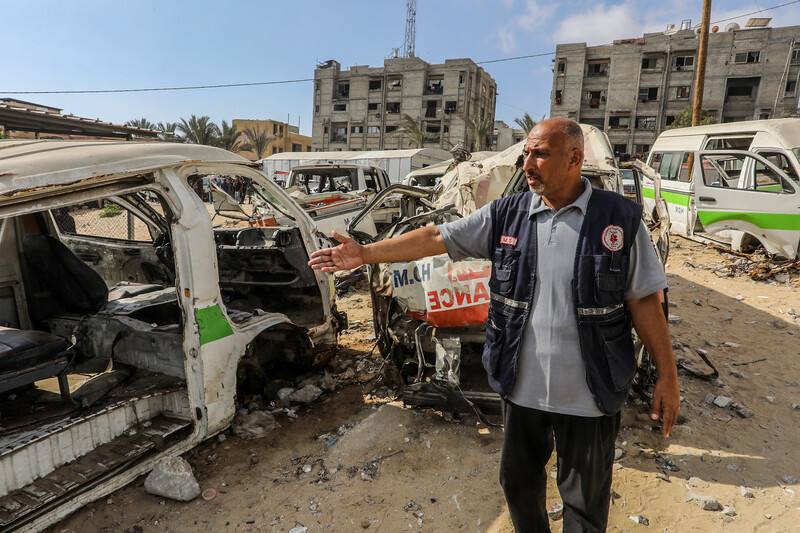
Ambulances and emergency vehicles taken out of service due to shelling and destruction by Israeli bulldozers during incursions into several cities, 14 September.
DPA via ZUMA PressMore than 81,600 Palestinians were displaced from northern Gaza to the south between 17 and 20 September, following a mass displacement of nearly 69,000 people between 10 and 14 September.
More than 388,400 “displacement movements” were recorded by humanitarian agencies and international organizations between 14 August and 23 September – “an average of about 9,700 movements per day,” according to the UN Office for the Coordination of Humanitarian Affairs. The actual number is likely higher, as many people were moving during the night when monitoring is limited, the UN office added.
Most of these movements were people moving from Gaza City towards Khan Younis and Deir al-Balah. These areas were projected to face famine by the end of September, according to the Integrated Food Security Phase Classification.
The Khan Younis and Deir al-Balah governorates received around 127,000 across more than 350 displacement sites, according to OCHA, bringing the population at those sites to more than half a million people.
“These include about 50,000 at 46 UNRWA designated emergency shelters, of which 20 were reactivated in September and provide shelter to about 15,000 [internally displaced people],” OCHA added.
The majority of people were arriving to displacement sites without tents, which remain “both scarce and unaffordable … with market prices reaching approximately $1,000,” OCHA stated.
Eleven UNRWA facilities in Gaza City serving as emergency shelters for around 11,000 people “sustained significant damage either directly or indirectly by strikes between 11 and 16 September,” according to OCHA.
As of 16 September, the UN agency was “still operating 29 emergency shelters hosting more than 4,500 families in Gaza City and continues to operate three medical points, including two conducting nutrition activities,” OCHA added.
UNRWA was also providing water for domestic use to around 350,000 people in Gaza City.

Women gaze at the rubble of demolished homes in al-Sir in the Naqab (Negev) region on 17 September. Hundreds of Israeli police officers raided the Bedouin village and demolished 35 houses, wiping out an entire neighborhood. In response, villagers set their own homes ablaze and burned tires to impede police activity.
ActiveStillsOn 17 September, the UN human rights office in the West Bank and Gaza Strip said that Israeli authorities “must immediately comply with” a recent high court ruling ordering that the state improve “the quantity and quality of food provided to Palestinian prisoners.”
“The court confirmed that the conditions deliberately imposed by Israeli authorities fail to meet basic nutritional standards,” the UN office stated, adding that “the authorities have publicly refused to comply with the order.”
At least 75 Palestinians, including a 17-year-old child, have died in Israeli detention between 7 October 2023 and 31 August 2025, the UN office said.
“Israeli authorities have released information indicating the death of another 19 detainees, without sufficient details to enable the verification of their identity,” the UN office added.
An additional five Palestinians, including a 16-year-old child, died in Israeli custody shortly after being shot, “in some cases following a failure to ensure prompt medical attention after the unlawful use of lethal force,” the office said.
More than 20 of the detainees who died in custody had health conditions requiring medical care prior to arrest and the denial of treatment may have contributed to their deaths, according to the UN office.
“In at least 12 cases, we gathered testimonies or evidence in the form of autopsy reports that detainees died after being beaten or tortured by Israeli security forces,” the office added.
The office said it had also documented “systematic torture and ill-treatment” against Palestinian prisoners. These forms of abuse include “repeated beatings, waterboarding, stress positions, the use of rape” and deliberately inhumane conditions including starvation.
“They amount to war crimes and may, in certain circumstances, amount to a crime against humanity,” the UN office said.

People evacuate Beach refugee camp north of Gaza City and attempt to leave the shattered area as Israeli forces continue to bombard the area, 19 September.
ActiveStillsAn Israeli drone dropped grenades on Al-Rantisi Children’s Hospital in Gaza City on 17 September, the ministry of health stated.
“No casualties were reported but the ministry said some 40 families took their children away,” Reuters reported.
The following day, Israeli tanks rolled towards the center of Gaza City amid a telecommunications and internet blackout and while the military continued to pound the area.
The Palestinian Telecommunications Company said that evening that it was able to reactivate internet and landline services, which were knocked out due to “the targeting of the main network routes.”
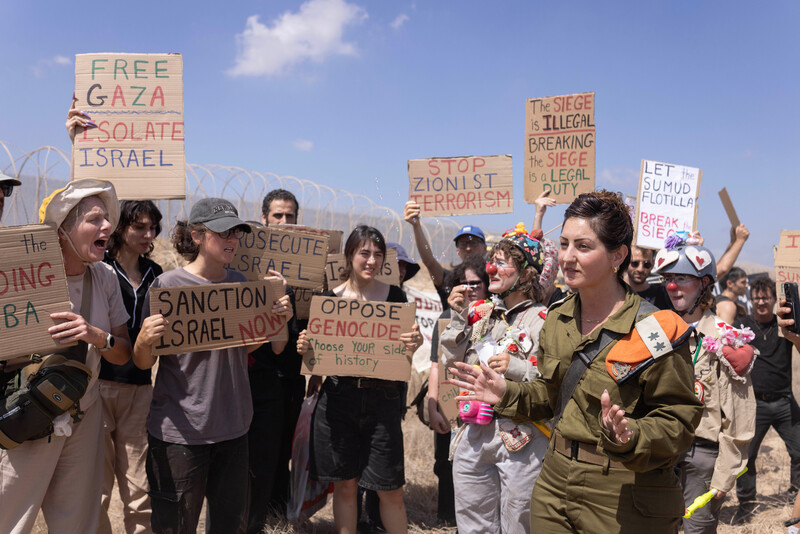
Israeli anti-occupation activists march to the Gaza boundary fence to protest against the genocide in Gaza and in solidarity with the Global Sumud Flotilla.
ActiveStillsOn 18 September, Al Mezan said that one year after the UN General Assembly passed a resolution demanding that Israel end its occupation, “the international community has utterly failed to enforce its own call.”
Instead, it has enabled “Israel to continue its unlawful occupation and to carry out genocide against the Palestinian people in Gaza.”
The UN resolution was passed after the International Court of Justice issued an advisory opinion confirming the illegality of the occupation.
Israel was given a period of a year to comply with the General Assembly’s demands to withdraw its armed forces and settlements from occupied Palestinian land, dismantle its wall in the West Bank, return stolen land and assets, uphold Palestinian refugees’ right of return and make reparations resulting from the unlawful occupation.
Instead of upholding their obligations, states have made “only meager attempts” to recognize a state of Palestine, Issam Younis, the director of Al Mezan, stated.
“These statements of recognition do not meet the level of non-symbolic action required to end Israel’s genocide, the unlawful occupation and the brutal apartheid regime,” Younis added.
On the one-year anniversary of the ICJ advisory opinion and the General Assembly resolution, UN experts called for sanctions on Israel and individuals and businesses “doing business with a genocidal regime.”
They also called for Israel’s removal from the UN and a full arms embargo on the country and the prosecution “of all citizens and visitors in their jurisdiction who serve or who have served in the Israeli military and contributed to the occupation, apartheid and genocide regime.”
Also on 18 September, the UN Security Council failed to pass a resolution demanding an immediate, unconditional and permanent ceasefire in Gaza after the US vetoed the measure.
Fourteen out of the 15 countries on the Security Council voted in favor of the draft resolution.
Save the Children said the failure to pass a resolution was “an abdication of legal and moral responsibility to children.”
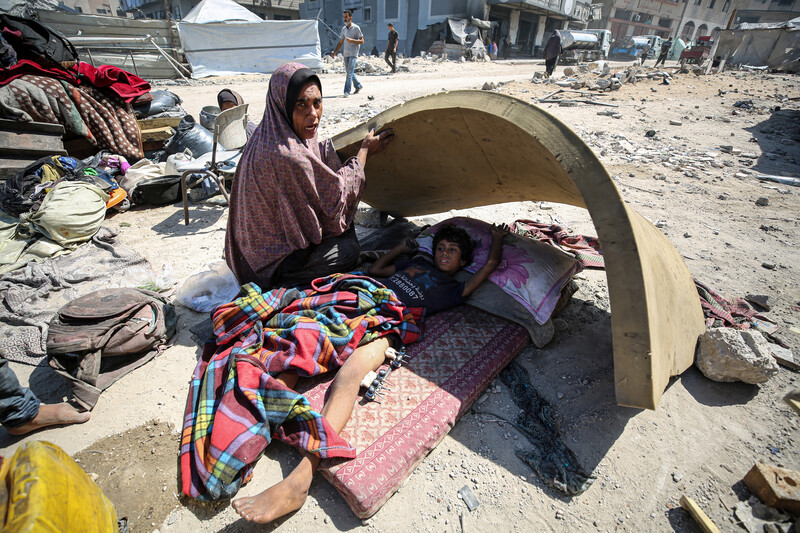
People who fled the north and moved southward arrived to central Gaza after Israeli forces ordered residents of Gaza City to evacuate to the south, 19 September.
APA imagesAn Italian port town refused entry to two trucks said to be carrying arms en route to Israel “as protests mount among Italian dockworkers and other labor groups against the offensive in Gaza,” Reuters reported on 18 September.
“The Italian state says it has blocked the sale of arms to Israel but it is unacceptable that, thanks to bureaucratic loopholes, they can pass through Italy from other countries,” Alessandro Barattoni, the mayor of Ravenna, stated.
Italy’s largest trade union held a national half-day strike and held marches on 19 September and shut down two major ports on 22 September to pressure the government “to suspend all commercial and military cooperation agreements with Israel, lift the humanitarian embargo, and recognize the state of Palestine.”
Also on 18 September, a group of 10 US senators led by Jeff Merkley, a senior member of the Senate Foreign Relations Committee, introduced the first resolution urging recognition of a Palestinian state.
The measure is not expected to succeed in the Republican-dominated Senate but signals a shift in sentiment towards Israel. A Reuters/Ipsos poll from August “showed that a majority of Americans – 58 percent - believe that every country in the United Nations should recognize Palestine as a nation,” according to the news agency.
On 19 September, news media reported that the Trump administration is seeking approval from Congress to sell $6.4 billion in weapons to Israel.
“The planned package includes a deal worth $3.8 billion for 30 AH-64 Apache attack helicopters and $1.9 billion for 3,250 infantry assault vehicles for the Israeli army,” according to Reuters.
“Another $750 million worth of support parts for armored personnel carriers and power supplies are also working its way through the sale process,” Reuters added, citing an unnamed person “familiar with the matter.”

A Palestinian man walks past a locked gate during the weekly tour of Hebron’s Old City by Israeli settlers, 20 September. The provocative tours are part of ongoing efforts by settlers to take over the West Bank city, especially the area around the Ibrahimi Mosque.
ActiveStillsOn 18 September, a driver carrying humanitarian aid destined for Gaza opened fire at the sole crossing between Jordan and the West Bank, killing two Israeli soldiers.
The gunman, identified by the Jordanian authorities as Abdul Mutalib al-Qaisi, was shot and killed at the scene.
Another Jordanian truck driver shot and killed three civilian Israeli border workers at the same crossing in September 2024 before being shot dead.
Also on 19 September this year, UNICEF said that in Gaza, gunmen stole therapeutic food from four trucks, denying at least 2,700 malnourished children from lifesaving supplies.
On 22 September, Palestinian resistance fighters executed three men accused of collaborating with Israel in Gaza City.
Widely circulated video shows a masked man warning “all collaborators” before the kneeling and blindfolded men are kicked and “shot in front of a crowd,” according to Reuters.
Israeli leaders have admitted to arming militias in Gaza – the most prominent among them Yasser Abu Shabab’s group – to undermine Hamas’s ability to govern.
An unnamed Palestinian security official told Reuters that some of the men executed on 22 September had ties to Abu Shabab’s group, which is promising new recruits monthly salaries of around $900 to $1,500 in social media advertisements.
On 24 September, “40 armed individuals confronted NRC [Norwegian Refugee Council] staff and contingent workers at one of our premises in Gaza City,” the organization said.
The staff were preparing “to relocate contingency supplies for operational needs” and were questioned by the armed group about “the movement of these items, particularly fuel,” the Norwegian Refugee Council stated.
The armed individuals “forcibly took” around 250 liters of fuel as well as food parcels and water bottles. The Norwegian Refugee Council added that it was investigating another report that maintenance materials were seized from another site that it supports.
Between 1 and 22 September, nearly 1,100 aid trucks “were intercepted during transit in Gaza – either peacefully by desperate civilians or forcefully by armed criminals,” according to the UN Office for the Coordination of Humanitarian Affairs.
“These incidents accounted for 73 percent of all collected supplies so far in September, significantly undermining the delivery of humanitarian assistance,” the UN office added.
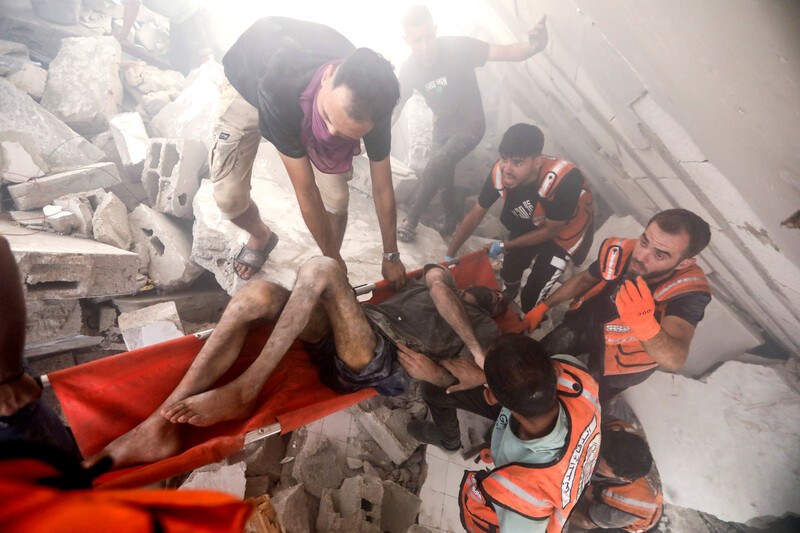
Civil defense teams and local residents carry an injured man out of the rubble after Israeli airstrikes targeted a home belonging to the al-Shawa family in Gaza City on 22 September. The strike ignited a fire in the targeted building and completely destroyed a neighboring structure.
ActiveStillsOn 21 September, the UK, Canada, Australia and Portugal recognized a Palestinian state ahead of a high-level international conference on the two-state solution chaired by France and Saudi Arabia. Emmanuel Macron, the president of France, announced that his country would also recognize a Palestinian state.
Luxembourg, Malta, Belgium and Monaco have also recognized a Palestinian state. On 22 September, those states “joined the more than three-quarters of the 193 UN members who already recognize a Palestinian state,” Reuters reported.
Singapore said it would recognize a Palestinian state pending an “appropriate constellation” of factors and announced that it would impose sanctions on Israeli settler groups in a rebuke to Israel’s so-called E-1 settlement project that would bisect the West Bank.
Slovenia – which recognized a Palestinian state last year and imposed an arms embargo on Israel and a ban on the import of settlement goods last month – placed Netanyahu, who is wanted by the International Criminal Court, under a travel ban in September.
Both France and the UK are permanent members of the UN Security Council as well as historic allies of the US and Israel.
The summit, boycotted by Israel and the US, was held on the opening day of the 80th session of the General Assembly in New York.
Mahmoud Abbas, the leader of the Palestinian Authority, delivered his remarks to the General Assembly by video on 25 September.
Last month, the Trump administration announced that it would deny visas to members of the Palestinian delegation.
The state of Palestine has observer status at the UN but lacks voting rights. The Security Council, where the US holds a veto, would need to approve the state of Palestine gaining full UN membership.
Abbas said that the Palestinian Authority was prepared to take responsibility for governing Gaza. Abbas, who is also leader of the Fatah faction, a bitter rival of Hamas, rejected the 7 October 2023 attacks and said that they “do not represent the Palestinian people, nor their just struggle for freedom and independence.”
He added that “we do not want an armed state.”
On 12 September, the General Assembly voted overwhelmingly in favor of a resolution endorsing the “New York Declaration” that came out of a meeting organized by France and Saudi Arabia in July.
The declaration, billed by France’s ambassador to the UN as “a single roadmap to deliver the two-state solution,” calls for the disarmament of Hamas and normalization between Israel and Arab states.
More than 140 countries voted in favor of the resolution, 12 abstained and 10 states, including the US and Israel, voted against it.

People react after a deadly Israeli attack on a group of civilians preparing to move south in Beach refugee camp, west of Gaza City, 23 September.
ActiveStillsOn 23 September, the UN human rights office said the number of civilians killed in Gaza City had sharply increased while Israeli authorities, “especially the minister of defense, have publicly threatened to destroy Gaza City if Hamas does not comply with Israel’s demands.”
Meanwhile, Israel did not authorize any government-to-government aid convoys following the killing of two soldiers by a Jordanian national at Allenby crossing on the West Bank-Jordan boundary on 18 September.
“The closure of Zikim crossing since 12 September by the Israeli authorities has resulted in the humanitarian community losing direct access to northern Gaza,” the UN Office for the Coordination of Humanitarian Affairs said.
Meanwhile, according to OCHA, the amount of food aid entering Gaza remained inadequate and far below that which entered Gaza during the January ceasefire and before Israel closed the crossings at the beginning of March. Humanitarian organizations were largely unable to bring any food aid to northern Gaza, “where hundreds of thousands remain and where a famine was confirmed on 22 August,” OCHA added.
“Meat, vegetables and dairy products, which are normally supplied through commercial channels, remain largely unavailable or unaffordable,” according to OCHA.
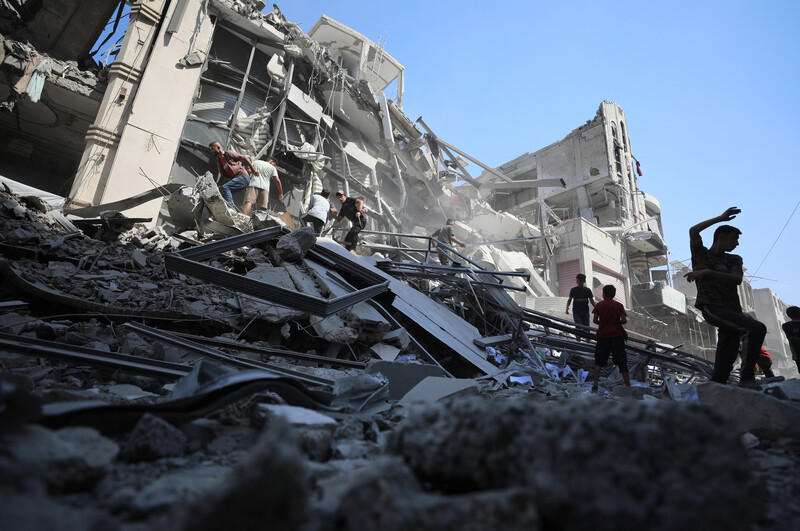
Palestinians inspect the destruction after an Israeli airstrike on the completely destroyed Bank of Palestine in Gaza City on 24 September.
APA imagesDuring the Israeli prime minister’s address to a largely empty UN chamber on 26 September, after dozens of delegates walked out as he took to the podium, Netanyahu said that there would be no Palestinian state. He told “Western leaders” that “Israel will not allow you to shove a terror state down our throats.”
“My opposition to a Palestinian state is not simply my policies or my government’s policy. It’s the policy of the state and people of the state of Israel,” Netanyahu said.
The Israeli prime minister also denied what he called “the false charge of genocide,” rejecting accusations that the military deliberately targets civilians.
Netanyahu said: “The comparison to genocide, wholesale slaughter of populations. What, did the Nazis ask the Jews to leave?”
On 25 September, Trump said he would not allow Israel to annex the West Bank following calls by far-right Israeli politicians to extend Israeli sovereignty to the territory in retaliation for states recognizing a Palestinian state during the UN General Assembly meeting.
Israeli threats to formally annex Palestinian land has been met with concern by Arab leaders, who met with Trump on the sidelines of the UN meeting.
The so-called E-1 Israeli settlement plan that would bisect the West Bank and sever it from Jerusalem received final approval in August. Netanyahu signed off on the plan in September.
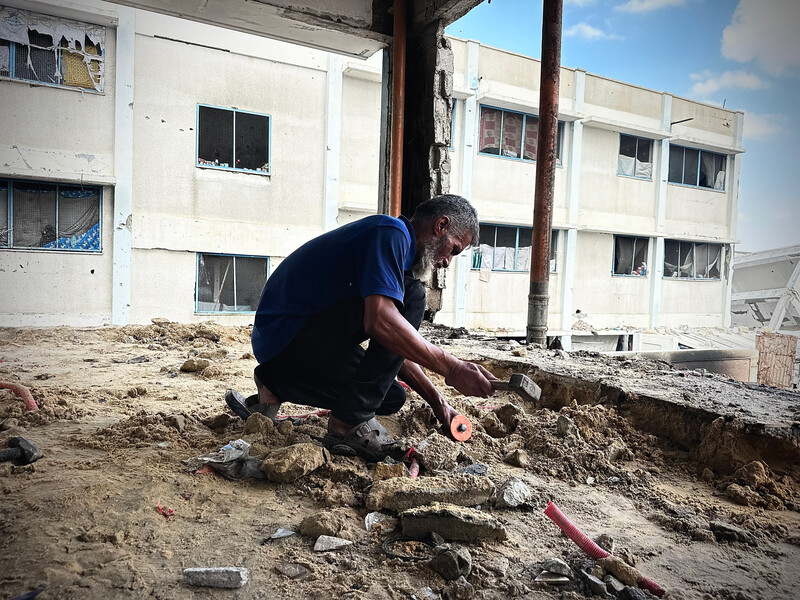
A man cleans a room that was previously used as a bathroom in order to create a living space for his family in a damaged school in al-Masawi, in the southern Gaza Strip, on 24 September.
ActiveStillsOn 22 September, the health ministry in Gaza said that Israeli attacks had forced two Gaza City hospitals – Al-Rantisi Children’s Hospital and a nearby eye hospital – to suspend services.
Meanwhile, the Jordanian military announced that its field hospital in the Gaza City area would be relocated to Khan Younis in southern Gaza due to constant bombardment.
Doctors Without Borders stated on 26 September that “the relentless Israeli offensive in Gaza City” had forced it to suspend its vital services in the area.
The charity pointed to “the rapidly deteriorating security situation, including continued airstrikes and advancing tanks less than half a mile from our health care facilities.”
Doctors Without Borders said that hundreds of thousands of people remain in Gaza City “who are unable to leave and have no other option but to stay.”
“Those who can leave face an impossible choice,” the charity added, with “no safe space in Gaza.”
“At the same time, there is not a single fully operational hospital in the whole Strip,” Doctors Without Borders said.
Nearly half of all malnutrition treatment centers in and around Gaza City had closed, a UN spokesperson said on 22 September.
Meanwhile, Israeli restrictions on aid were hindering life-saving support to civilians.
The health ministry said on 19 September that 162 people, 32 of them children, died from starvation and malnutrition since famine was formally confirmed in Gaza the previous month, according to Stéphane Dujarric, the UN spokesperson.
Tens of thousands of people were crammed into tent shelters on the beach or in already overcrowded school shelters while others were “sleeping in the open on the rubble of destroyed buildings and houses,” Dujarric said.

The funeral for 20-year-old Said al-Nassan in al-Mughayyir, east of Ramallah in the West Bank, following his death from settler fire during a raid on the village the previous day, 24 September. Israeli settlers opened fire toward mourners and photographers who were present, but did not hit anyone.
ActiveStillsOn 26 September, Al Mezan, a Palestinian human rights group based in the Strip, said that “time is running out for Gaza.”
“As part of Israel’s plan to permanently take over Gaza City, Palestinians are being forcibly displaced from the city under life-threatening conditions,” Al Mezan stated.
“Those fleeing do so under heavy bombardment and with no safe routes or destinations to go to.”
Families with the means to do so “are forced to move in overcrowded vehicles or, due to the soaring cost of transportation, by foot, carrying only what they can.”
Meanwhile, the places that Israel has ordered people to move to are “plagued by mounting pollution, infectious diseases and severe shortages of safe drinking water and food,” Al Mezan said.
Those areas also are being attacked, the rights group added.
Israel’s offensive has “completely overwhelmed what remains of Gaza City’s health system,” Al Mezan said. Hospitals are receiving a “huge influx” of casualties amid a severe shortage of blood units and other essentials.
“Scarce medical supplies means that malnutrition cannot be properly treated,” the group added, while vital civilian infrastructure has “ground to a halt, threatening a full-scale public health disaster.”
“At the same time, Israel has deliberately cut off water supplies,” Al Mezan said.
“Silence and inaction at this stage constitutes a shameful complicity in this genocide,” Al Mezan stated.
“Every day of delayed action means tacit approval of the collective death of Gaza’s population.”

People conduct a search and rescue operation after Israeli strikes on houses at Beach refugee camp in Gaza City on 26 September.
APA imagesOn 27 September, the European Commission and the governments of 28 countries – including Australia, Canada, France, Germany and the UK – issued a joint statement saying that they “stand ready to provide support” medical treatment of patients from Gaza.
“We strongly appeal to Israel to restore the medical corridor to the occupied West Bank, including East Jerusalem, so medical evacuations from Gaza can be resumed and patients can get the treatment that they so urgently need on Palestinian territory,” they stated.
The UN human rights office in the West Bank and Gaza stated on 29 September that Israeli attacks “on and around hospitals in Gaza City are leaving sick and injured civilians with nowhere to turn for life-saving care.”
The office said that since 16 September, it had recorded at least 17 Israeli attacks on or near health facilities “in all areas of Gaza City,” including direct strikes on Al-Quds Hospital, Al-Rantisi Children’s Hospital and the Medical Relief Health Center.
The UN office added that the Palestine Red Crescent Society said on 23 September that “Israeli ground forces were stationed at the gate of Al-Quds Hospital in Tel al-Hawa and were besieging the hospital.”
The health ministry said that as of 25 September, “only seven out of 13 hospitals in Gaza City were operational, but only barely,” the UN office added.
As of 29 September, more than 7,840 patients had been evacuated from Gaza since October 2023, while 15,600 critical patients “still require medical evacuation,” according to the UN Office for the Coordination of Humanitarian Affairs, citing the World Health Organization.
On 29 September, UNICEF called for an immediate evacuation of at least 25 premature babies in incubators in Gaza City amid Israel’s escalating offensive.
Half of the babies at risk were being cared for at a hospital that was shelled the night before, Reuters reported.
“Palestinian health officials say tanks are surrounding the area near Al Helou Hospital where at least 12 babies are in incubators,” according to Reuters, which said it obtained video showing “hospital rooms and beds there strewn with debris.”
A UNICEF spokesperson said that one of the babies, a girl named Narges, “had been removed from the womb of her dead mother who had been shot in the head,” Reuters reported.
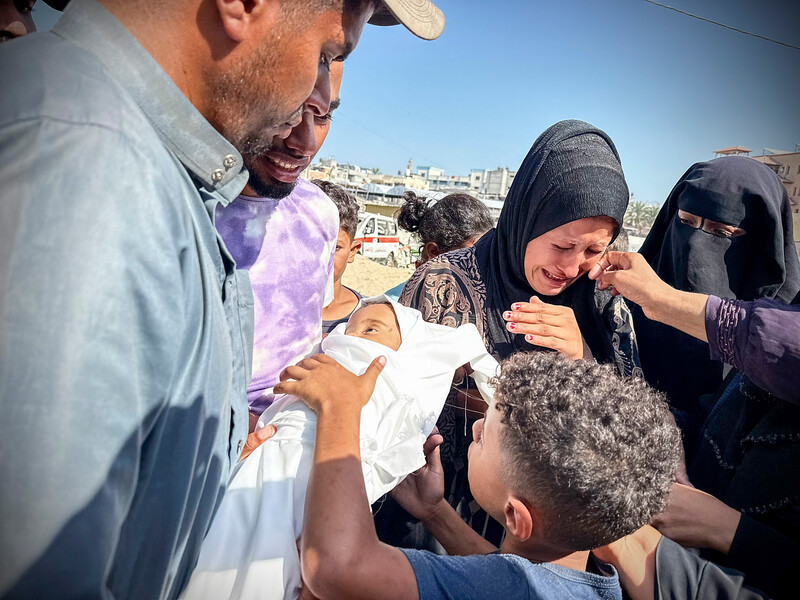
Mourners bid farewell to 11-month-old Isil Salem al-Arja, who died at Nasser Medical Complex in Khan Younis, southern Gaza, 26 September. The baby was severely malnourished due to a lack of milk and nutritious food in their displacement camp. She had been hospitalized two weeks earlier but was forced to return to dire living conditions, leading to her death.
ActiveStillsThe UN added 68 new businesses to its database of companies operating in Israel’s settlements in the occupied West Bank, bringing the total to more than 150.
Heidelberg Materials was added to the database, which includes Airbnb, Booking.com, Expedia and Tripadvisor. Seven businesses were removed from the database after they ceased their involvement in the settlements.
The UN human rights office announced the updates in a report published on 26 September.
Earlier in the month, eDreams ODIGEO, a Spanish travel company, blocked listings of accommodations in West Bank settlements. The company was the only one based in Spain to be included in the database when it was published in 2023.
On 24 September, AkademikerPension, a Danish fund manager, announced that it was excluding Israeli state assets from its nearly $25 billion investment portfolio “due to the war in Gaza and the expansion of Israeli settlements in the West Bank,” Reuters reported.
“It is the latest decision by a European fund manager to curtail investments in Israel, following recent divestments by Norway’s $2 trillion sovereign wealth fund,” Reuters added.
On 25 September, Microsoft announced that it had disabled the use of its Azure cloud service and artificial intelligence services by the Israeli military’s Unit 8200.
Use of the technology by the notorious intelligence unit was exposed last month by The Guardian, +972 Magazine and Local Call.
The publications reported that Unit 8200 used Azure “to store vast amounts of data on millions of Palestinian civilian phone calls in the Israeli-occupied West Bank and Gaza,” according to the Israeli publication Haaretz.
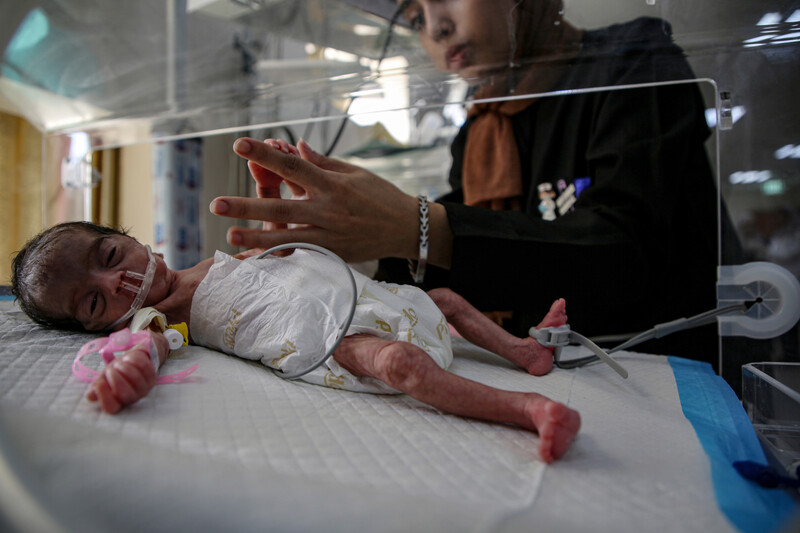
A baby born prematurely receives care in an incubator at Al-Aqsa Martyrs Hospital in Deir al-Balah, central Gaza Strip, where the neonatal unit is overcrowded after infants were transferred from hospitals in Gaza City following the Israeli ground incursion, 29 September.
APA imagesThe UN human rights office in the West Bank and Gaza Strip said on 29 September that the Israeli military was “destroying Gaza City, forcing Palestinians to flee and then killing them when they seek shelter” in central Gaza, particularly in and around Nuseirat refugee camp.
Between 24 and 28 September, the UN office said that it recorded 12 incidents in the Nuseirat and al-Zawayda areas resulting in the deaths of 89 people, “most of whom appear to be civilians, including many children and women.”
Seventeen people, including children, were killed in a strike on a crowded market in Nuseirat camp on 27 September.
The Israeli military has meanwhile been killing and injuring people gathering firewood, the UN office said. Fourteen such attacks were recorded between 1 August and 23 September, resulting in the deaths of 21 people, including a child.
Israel has blocked the entry of cooking gas to Gaza since the beginning of March, forcing people to rely on wood to prepare food.
Israel’s strikes and the use of lethal fire against people collecting firewood “suggest a policy of preventing Palestinians from accessing the necessities of life,” the UN office added.
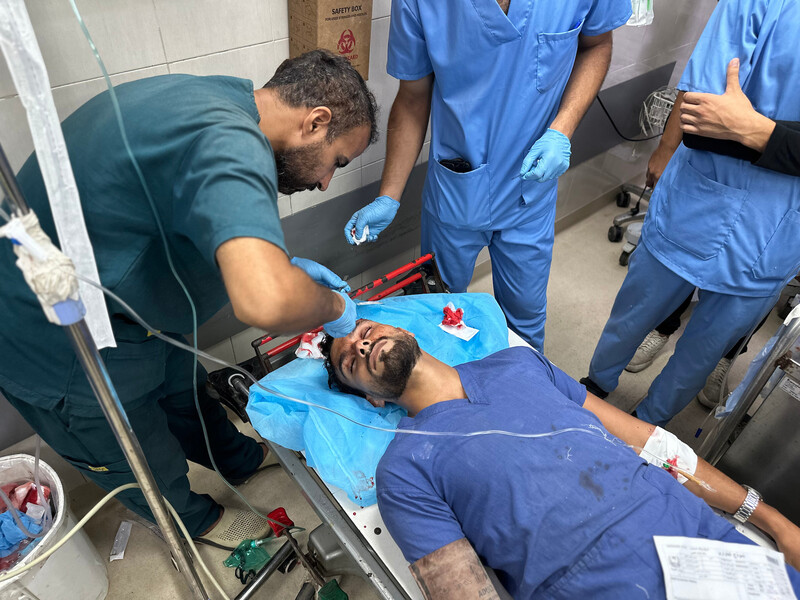
A nurse is treated at the emergency department after being shot in the head by Israeli forces while on duty at Nasser Medical Complex in Khan Younis, southern Gaza Strip, 29 September.
APA imagesDonald Trump announced a new US-backed scheme for Gaza alongside Netanyahu, who said that it satisfied Israel’s war aims, at the White House on 29 September.
Trump said that he was giving Hamas three or four days to respond to what he characterized as an ultimatum.
The scheme calls for an immediate ceasefire, the release of all captives in Gaza within 72 hours, the release of around 2,000 Palestinian prisoners and a staged Israeli withdrawal from Gaza. It also calls for the disarmament of Hamas, a red line for the group, which says that it is tantamount to surrender.
Hamas was under heavy international pressure, including from Arab states, to accept the proposal, even though the provisions of the scheme meet all of Israel’s conditions while conditioning basic Palestinian rights – like access to food and humanitarian assistance – upon Hamas’ surrender.
The day after the White House announcement, the Israeli military dropped new leaflets over Gaza City ordering residents to leave to the south.
“The battle against Hamas is decisive and will not end until it is defeated,” the leaflets stated, according to Reuters.
Israel and Hamas signed an agreement for the first phase of a Gaza truce deal on 9 October. Hamas leader Khalil al-Hayya said that the faction had received guarantees from Washington to ensure a permanent end to the war, Reuters reported.

US President Donald Trump leads a trilateral phone call with Israeli Prime Minister Benjamin Netanyahu and Qatari Prime Minister Mohammed bin Abdulrahman bin Jassim Al Thani discussing the US plan for Gaza in the Oval Office of the White House on 29 September. (Official White House Photo by Daniel Torok)
On 30 September, Yemen’s Ansar Allah announced sanctions on major US oil companies, including ExxonMobil and Chevron, in retaliation for measures imposed by Washington.
Washington imposed the measures despite a truce agreement between Ansar Allah and the Trump administration that ended US strikes on Yemen and Yemeni attacks on US-linked ships in the Red Sea and the Gulf of Aden.
Ansar Allah has enforced a blockade of traffic destined for Israeli ports in protest of Israel’s genocide and siege.
The group claimed responsibility for a cruise missile attack on a Dutch cargo ship that injured two crew members and left “the vessel ablaze and adrift” in the Gulf of Aden, according to Reuters.
One of the crew members, a national of the Philippines, died from his injuries in October.
Israel said that it intercepted a missile fired from Yemen on 25 September, hours after the Israeli military hit targets in Sanaa, the capital of Yemen.
At least 46 people were killed in Israeli strikes on Yemen on 10 September. Israel said that the strikes were in reprisal for the launching of drones and missiles from Yemen.
The military spokesperson for Ansar Allah said that the offices of two newspapers were among the targeted sites, and that journalists and bystanders were killed and wounded, according to Reuters.
Meanwhile in Lebanon, five people were killed in an Israeli drone strike on the southern town of Bint Jbeil.
Nabih Berri, the speaker of the Lebanese parliament, said that among those killed were a father and his three children.
Text and production by Maureen Clare Murphy


